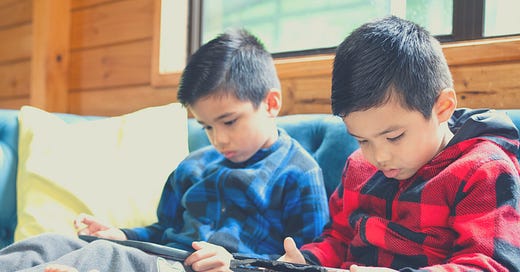I don't know who needs to hear this right now, but here goes: parents should not feel guilty for relying on screen time during an unprecedented global pandemic. Articles that induce screen time panic were unhelpful before COVID-19—and they are borderline cruel now that life-as-we-know-it has changed so drastically. Social distancing has transformed how we're working, learning and socializing, and parents just don't have the same kind of support from family and friends that they did before. All this means that we are struggling to find a balance—all while trying to keep children happy, healthy and occupied. And it's hard.
Parenting right now is no small feat—and honestly, technology has been a huge help for my family. That's why articles designed to shame us for increased screen time are so upsetting. Case-in-point: last week’s article from the New York Times which actually suggests parents are failing their children by allowing them more access to screen time. Quotes from addiction specialists suggest that kids are going to go through an epic period of withdrawal if they spend too much time with their devices—a claim that's disputed among experts. But the most frustrating aspect of an article like this is that there is no solution offered—just alarming rhetoric.
What parents need is some real-talk from experts who have experienced the reality of pandemic parenting first-hand. Rather than shaming parents about screen time, let's just have an honest conversation about the challenges we're facing. I'll start: while my family embraces technology, we still have our own screen time struggles. We still have arguments with our daughter about the way she uses her device and her attitude when she's not on a screen. Do we want her to enjoy a diverse array of activities and spend time IRL with family and friends? Of course. But is that possible for her right now? Not really. So we're doing our best with the circumstances we're in—and sometimes that involves more screen time. If an online game is the only way she can connect with her friends, I can't take that away from her in good conscience.
And it looks like I'm not the only one who feels this way. It was encouraging to read through the article's comments and find others who weren't buying this narrative. As one 15-year-old reader pointed out, "I know that for many teens and kids all they want to do is go outside and play with their friends but they can’t. I admit to spending an excess time on my phone during the pandemic but I would give it all up to go play basketball with my friends or have a sleepover, etc." And this comment from a like-minded parent summed up my sentiment pretty well: "Puhleeze. Devices have been my kids’ only way to socialize during this pandemic. Far from endangering them or causing them trouble, “screen time” has saved my kids’ sanity. They play with their friends from morning to night. They’ve actually strengthened relationships. What could be more wholesome than that?"
I may not be an addiction specialist, but I am a dad that's raising two small humans, and I'm here to tell you this: keep doing the best you can with the tools you have. And don't let an alarming headline make you feel bad for it.
A deeper dive
Here are a few helpful resources in case you want to really dig into today's topic:
For all the negative headlines about screen time, there are just as many stories about technology having a positive impact on people's lives. In fact, the very same author who wrote the article in question above recently wrote about how A.A. members are thanking Zoom for their very survival. It just goes to show that every screen time headline must be taken with a grain of salt.
And in fact, the New York Times just published an article with the headline "The Upside of Screen Time," and it's all about how "[k]ids are expanding their tech savvy to connect and explore creatively." So there you go.
And one final thought: If experts really want to help parents out, they need to change their approach. We're in uncharted territory with the pandemic, and I'd like to see more thought leaders like Anya Kamenetz, who took this time as an opportunity to reevaluate her stance on screen time, offering empathy and compassion to parents.
Okay, that's it from me until next week. If you enjoyed this newsletter, and know of another parent who would as well, please feel free to forward it along.




